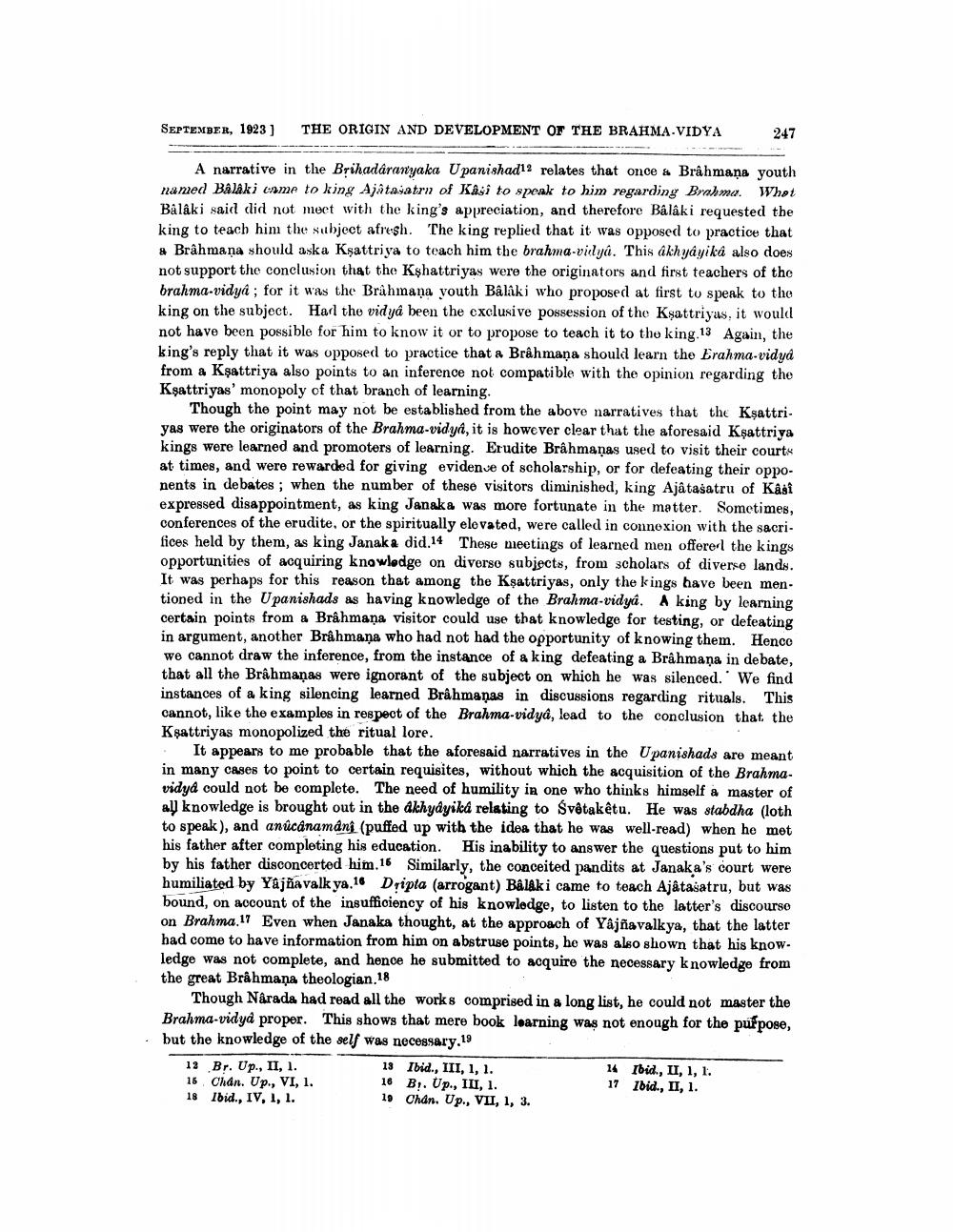________________
SEPTEMBER, 1923)
THE ORIGIN AND DEVELOPMENT OF THE BRAHMA.VIDYA
247
A narrative in the Brihadaranyaka Upanishadla relates that once a Brahmana youth named Balâki osme to king Ajâtajatrn of Kaši to speak to him regarding Brahma. Whet Bâlâki said did not meet with the king's appreciation, and therefore Bâlâki requested the king to teach him the subject afresh. The king replied that it was opposed to practice that # Brâhmana should aska Ksattriya to teach him the brahma-vidya. This akhyayikå also does not support the conclusion that the Kshattriyas were the originators and first teachers of the brahma-vidya ; for it was the Brahmaņa youth Bâlâki who proposed at first to speak to the king on the subject. Harl the vidya been the exclusive possession of the Kyattriyas, it would not have been possible for him to know it or to propose to teach it to the king 13 Again, the king's reply that it was opposed to practice that a Brahmana should learn the Erahma-vidya from a Kşattriya also points to an inference not compatible with the opinion regarding the Kşattriyas' monopoly of that branch of learning.
Though the point may not be established from the above narratives that the Kşattri. yas were the originators of the Brahma-vidya, it is however clear that the aforesaid Kşattriya kings were learned and promoters of learning. Erudite Brâhmaņas used to visit their court at times, and were rewarded for giving evidence of scholarship, or for defeating their opponents in debates ; when the number of these visitors diminished, king Ajátasatru of Kasi expressed disappointment, as king Janaka was more fortunate in the matter. Sometimes, conferences of the erudite, or the spiritually elevated, were called in connexion with the sacrifices held by them, as king Janaka did.14 These meetings of learned men offererl the kings opportunities of acquiring knowledge on diverso subjects, from scholars of diverse lands. It was perhaps for this reason that among the Kşattriyas, only the kings have been men tioned in the Upanishads as having knowledge of the Brahma-vidya. A king by learning certain points from a Brâhmana visitor could use that knowledge for testing, or defeating in argument, another Brahmana who had not had the opportunity of knowing them. Henco we cannot draw the inference, from the instance of a king defeating a Brâhmana in debate, that all the Brâhmanas were ignorant of the subject on which he was silenced. We find instances of a king silencing learned Brâhmaņas in discussions regarding rituals. This cannot, like the examples in respect of the Brahma-vidya, lead to the conclusion that the Keattriyas monopolized the ritual lore. • It appears to me probable that the aforesaid narratives in the Upanishads are meant in many cases to point to certain requisites, without which the acquisition of the Brahmavidyd could not be complete. The need of humility in one who thinks himself a master of all knowledge is brought out in the akhyayika relating to Svêtaketu. He was stabdha (loth to speak), and anúcánamáni (puffed up with the idea that he was well-read) when he met his father after completing his education. His inability to answer the questions put to him by his father disconcerted him.16 Similarly, the conceited pandits at Janak a's court were humiliated by Yajžavalk ya 16 Dripta (arrogant) Balak i came to teach Ajátasatru, but was bound, on account of the insufficiency of his knowledge, to listen to the latter's discourso on Brahma 17 Even when Janaka thought, at the approach of Yâjsavalkya, that the latter had come to have information from him on abstruse points, he was also shown that his know. ledge was not complete, and hence he submitted to acquire the necessary knowledge from the great Brâhmana theologian 18
Though Nárada had read all the works comprised in a long list, he could not master the Brahma-vidya propor. This shows that mere book learning was not enough for the pušpose, but the knowledge of the self was necessary.19 12 Br. Up., II, 1. 13 Ibid., III, 1, 1.
14 Ibid., II, 1, I. 16 , Chân. UP, VI, 1. 16 B:. Up., III, 1.
17 Ibid., II, 1. 18 Ibid., IV, I, 1.
19 Chan. Up., VII, 1, 3.




